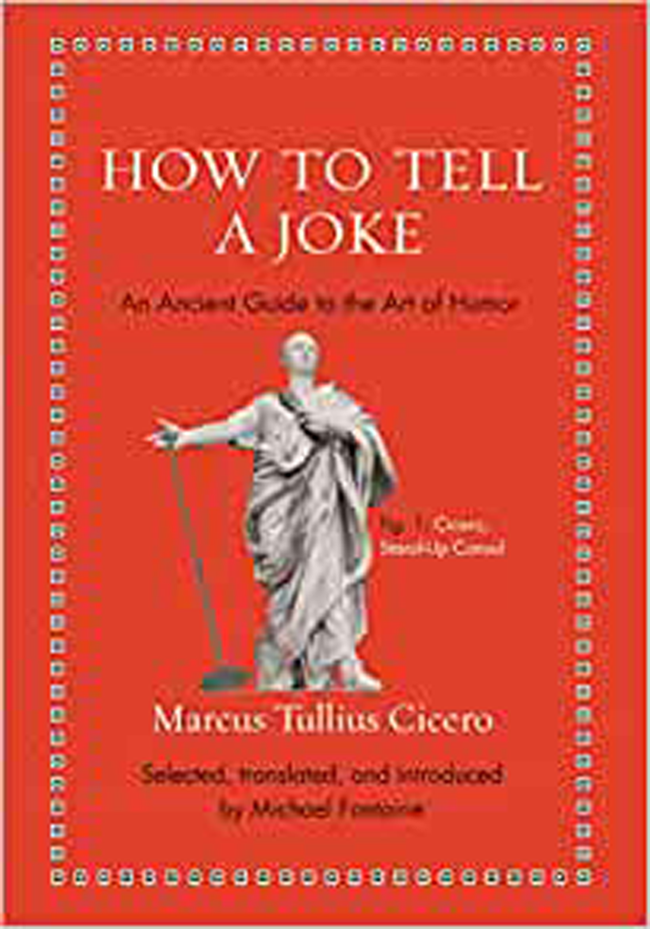
How to Tell a Joke is the latest in the Princeton series ‘Ancient Wisdom for Modern Readers’. In this new addition to the series, Professor Michael Fontaine starts with, what to the modern reader and avid watcher of stand-up comedy is a simple question. Can the art of humour be taught? Can a person be taught to be funny?
Professor Fontaine does not follow the route that a reader in books about humour would follow normally to answer this question; instead he lets two of the greatest specialists in oratory in Ancient Rome answer the question, namely Marcus Tullius Cicero, statesman, philosopher and one time Consul of the Roman Republic, and Marcus Fabius Quintilianus, better known as Quintilian, who held the chair of teaching Rhetoric at Rome some 150 years after the death of Cicero.
These two men answer the question of humour in a very different way from the mere point of making an audience laugh for the sake of comedy and entertainment. Their goal is the rhetorical and oratorical use of humour. How to tell a Joke is then not a recipe for comedy but for the strategic deployment of wit to disarm opponents in the political or the legal sphere. There is the famous legal saying that I have heard from all over the world: ‘If your case is based on the facts, you hammer on the facts; if your case is based on the law, you hammer on the law, and if you have nothing then you must hammer on the table!’
Essentially then this book outlines how you hammer on that table - how to sway the audience and even the judge in your favour by using all the skills of rhetoric and oratory including humour when you have nothing in your favour. Fontaine masterfully introduces us to this by his wonderful translations of De Oratore and the Institutio Oratoria. His translations make the Latin very accessible to the modern reader who might not have any skill in translation at all. This modern translation also makes the language of Cicero and Quintilian come alive to the reader. Even if you don't particularly find the sayings funny or even passingly amusing, it gives you a glimpse of the Roman sense of humour, barbs, quips and the workings of extraordinary jurists in a court playing to a captive audience. Fontaine says so in his own words: ‘Styles of translations vary. Some are literal, other go for the gist. This one goes for the jest … I've wracked my brains to find equivalent words, names, puns, phrasings, and cultural counterparts to make the jokes as funny in English as they are in Latin.’
Fontaine shows how Cicero thought about humour and how he used it. After the long dialogue in De Oratore, Cicero hands down this remark ‘…those who want to master jokes for public speaking need to be imbued with a certain – almost innate – sense of humour’. It becomes clear to the modern reader that Cicero meant you must have some form of talent to make people laugh. Cicero in his own defence speeches did not follow the rules of using humour as oratory - it was not that Cicero did not know the rules of etiquette, but was rather oblivious towards them: he just frequently overstepped this mark earning him poorer praise than was expected; additionally some severely derogatory insults, wrapped up in his witticisms, could well have been a contributing factor to his murder. If we read this wonderful book and read some of the history of Cicero, we come across a manwho was indeed a good lawyer, a good statesman, and even a great philosopher, but we also recognise that very modern trait in Cicero - that he says things at the wrong time. We would say, perhaps, Cicero had no filter!
Whereas, when Fontaine presents us with Quintilian, we immediately recognise the professorial image of the teacher of rhetoric. Although it is clear that Quintilian much admired the style and persona of Cicero, he does not quote him verbatim; instead, he expands on the ideas that Cicero puts forth. Another difference between the two naturally is that Cicero wrote in the form of a dialogue, while Quintilian writes to us in the essay form. Quintilian, just like Cicero, feeds jokes into his essay. What one might in the beginning have thought to be a very studious piece of work on oratory, Quintilian would sprinkle with humour. If you were a reader of this piece of work you might be tempted to just look for the jokes and forget the important lessons about oratory and rhetoric that Quintilian really wants to teach.
Fontaine does go out of his way to make the works of these two men very accessible but he also knows the important lessons that they need to convey about humour. Verily, yes, he does make the language modern, but it loses none of its punch in handling formidable Latin texts. What Fontaine has created here is a way for an ordinary reader to come in contact with an aspect of oratory and rhetoric and then to come away from it feeling smarter if not funnier!


